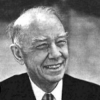Corliss Lamont

Corliss Lamont
Corliss Lamontwas an American socialist philosopher and advocate of various left-wing and civil liberties causes. As a part of his political activities he was the Chairman of National Council of American-Soviet Friendship starting from the early 1940s...
NationalityAmerican
ProfessionPhilosopher
Date of Birth28 March 1902
CountryUnited States of America
philosophy improvement humanist
Humanism involves far more than the negation of supernaturalism. It requires an affirmative philosophy . . . translated into a life devoted to one's own improvement and the service of all mankind.
religious art philosophy
I think . . . that philosophy has the duty of pointing out the falsity of outworn religious ideas, however estimable they may be as a form of art. We cannot act as if all religion were poetry while the greater part of it still functions in its ancient guise of illicit science and backward morals. . . .
heart character together
For the Humanist, . . . head and heart . . . must function together. . . . The constitution of the Phillips Exeter Academy reads: 'Though goodness without knowledge . . . is weak and feeble, yet knowledge without goodness is dangerous. . . . Both united form the noblest character and lay the surest foundation of usefulness to mankind.'
character self acting
True freedom is the capacity for acting according to one's true character, to be altogether one's self, to be self-determined and not subject to outside coercion.
creative initiative genuine
The dynamic, creative present, however conditioned and restricted by the effects of prior presents, possesses genuine initiative.
movement ongoing action
Human beings and their actions constitute the advancing front, the surging crest of an ongoing movement that never stops.
brain causes sequence
The cause-effect sequences in our brains are just as determining, just as inescapable, as anywhere else in Nature.
philosophy men self
The theory that everyone acts from self-interest, direct or indirect, is psychologically unsound. . . . Throughout history . . . there have been millions of men and women with some sort of Humanist philosophy who have consciously given up their lives for a social ideal.